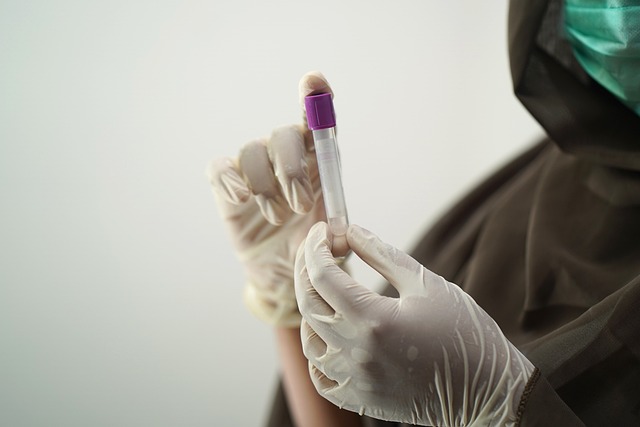Diabetes patients are at increased risk for Vitamin B12 deficiency due to dietary restrictions and absorption issues related to neuropathy, which can exacerbate diabetes and its complications. In the UK, Diabetes Blood Test UK is a critical healthcare tool offering early detection of B12 levels through serum measurements, enabling effective management and preventive care by facilitating timely interventions such as dietary adjustments or supplementation. Regular monitoring of B12 levels is essential for maintaining optimal health in diabetes patients, preventing the adverse effects of deficiency. The National Health Service (NHS) provides access to these tests for at-risk populations, including older adults, vegetarians, and diabetics, to assess potential deficiencies and manage related health issues effectively. Beyond the standard serum B12 test, additional tests like MMA and homocysteine can offer a more comprehensive understanding of B12 function and are particularly useful for diabetes management. Healthcare providers interpret these tests to tailor treatment plans, ensuring patients receive personalized care that improves health outcomes and quality of life. Regular testing and management of B12 levels through blood tests are indispensable in the UK's approach to diabetes and overall health maintenance.
Vitamin B12 plays a pivotal role in maintaining health and well-being, with its deficiency linked to an array of adverse health outcomes. The UK’s populace can face challenges in detecting such deficiencies, yet a Diabetes Blood Test UK offers a reliable tool for early identification and management. This article delves into the significance of Vitamin B12 in human health, the utility of blood tests as a diagnostic measure within the UK healthcare system, and a comprehensive guide to navigating diabetes blood test options specifically for B12 deficiency detection. Understanding these aspects is crucial for individuals and healthcare providers alike to ensure optimal health and prevent complications associated with Vitamin B12 insufficiency.
- Understanding Vitamin B12 Deficiency and Its Implications for Health
- The Role of Blood Tests in Detecting Vitamin B12 Levels in the UK
- Navigating Diabetes Blood Test Options for B12 Deficiency Detection in the UK
Understanding Vitamin B12 Deficiency and Its Implications for Health

Vitamin B12 is an essential nutrient that plays a pivotal role in maintaining optimal health. It is crucial for the production of red blood cells and the proper function of the nervous system. A deficiency in this vitamin can lead to anemia, neurological issues, and a host of other health complications. Individuals with diabetes are at an elevated risk for B12 deficiency due to various factors such as dietary restrictions, neuropathy affecting nutrient absorption, and altered metabolic processes associated with the condition. Detecting this deficiency early through blood tests is imperative as it can significantly impact one’s quality of life and overall health outcomes. In the UK, diabetes blood tests are widely available and form a cornerstone of diabetes management and preventive healthcare strategies. These tests measure serum B12 levels, providing healthcare professionals with the necessary information to diagnose deficiencies and recommend appropriate dietary changes or supplementation to mitigate potential health risks associated with this condition. Regular monitoring is key for those with diabetes, as it ensures timely intervention and management of B12 levels, thus safeguarding against the adverse effects of a deficiency, which can exacerbate both diabetes and its complications.
The Role of Blood Tests in Detecting Vitamin B12 Levels in the UK

In the United Kingdom, blood tests serve as a pivotal tool in the diagnosis and management of Vitamin B12 deficiency. These tests accurately measure the levels of this essential vitamin in the bloodstream, which is crucial for maintaining healthy nerve function and red blood cell formation. For individuals with diabetes, regularly monitoring B12 levels is particularly significant due to the increased risk of neuropathy associated with both conditions. The UK’s National Health Service (NHS) provides access to these tests, ensuring that those at risk, including the elderly, vegetarians, and those with diabetes, can be assessed for deficiency. The B12 blood test, often part of a routine screening or specifically requested by healthcare providers when symptoms like unexplained fatigue, cognitive decline, or gastrointestinal issues are present, is a straightforward procedure that can have profound implications for an individual’s health. It is through the consistent application and analysis of these tests that healthcare professionals can tailor treatment plans to address B12 deficiencies effectively, thereby improving patient outcomes and quality of life across the UK population.
Navigating Diabetes Blood Test Options for B12 Deficiency Detection in the UK

Navigating diabetes blood test options for B12 deficiency detection in the UK involves understanding the various tests available and how they differ in their specificity and scope. The most commonly used test for detecting Vitamin B12 levels is the serum B12 test, which measures the amount of vitamin B12 circulating in the blood at the time of the test. In the UK’s National Health Service (NHS), this test is readily accessible and often the first step in assessing B12 status. For individuals with diabetes, monitoring B12 levels is particularly important as both conditions can affect each other’s management and treatment outcomes. Additionally, the methylmalonic acid (MMA) and homocysteine tests are alternative options that can provide a more comprehensive understanding of B12 function in the body. These tests measure byproducts of metabolism that become elevated when there is a deficiency in vitamin B12. Patients with diabetes should discuss with their healthcare provider which test might be most appropriate for them, considering factors such as clinical symptoms and other health conditions. It’s crucial for those at risk of or experiencing B12 deficiency to receive timely and accurate testing to prevent complications associated with its deficiency, including neuropathy and anemia, which can exacerbate the challenges faced by individuals with diabetes. The choice between these tests should be guided by medical professionals who can interpret the results within the context of a patient’s overall health picture.
In conclusion, vitamin B12 deficiency is a significant health concern that can have profound effects on one’s well-being. In the UK, blood tests stand as a pivotal tool in diagnosing this condition, offering a reliable and accessible means to assess B12 levels, particularly within the context of managing diabetes. The diagnostic journey for B12 deficiency has been streamlined through the availability of various diabetes blood test options, ensuring patients receive timely and accurate results. These tests not only facilitate early detection but also guide treatment plans, improving health outcomes and quality of life. For those concerned about their vitamin B12 status, the diabetes blood test UK offers is a valuable resource for maintaining overall health.
